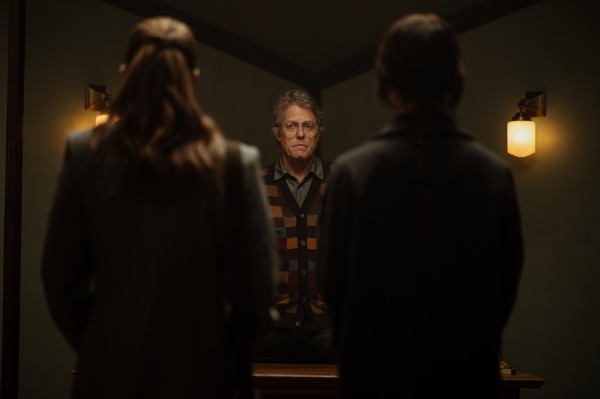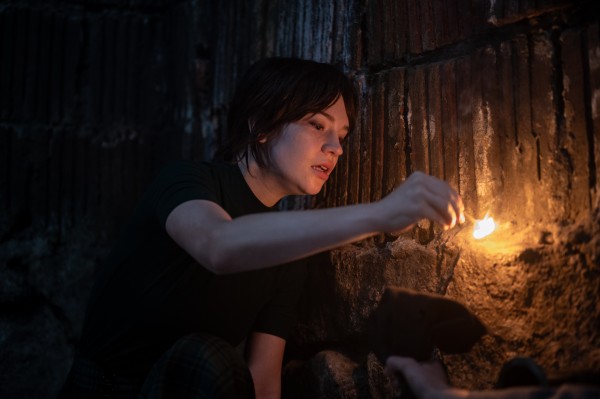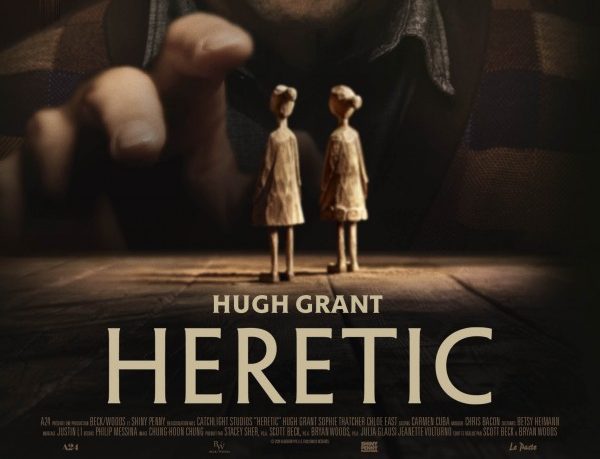This thriller film tells the story of two Mormon missionaries, who visit an Englishman living by himself in the woods of USA.
HERETIC. Starring: Hugh Grant, Sophie Thatcher, Chloe East, and Elle Young. Directed by Scott Beck and Bryan Woods. Rated MA15+ (Strong themes and violence).110 min.
Review by Peter W Sheehan, Jesuit Media Australia
Two young female missionaries, who belong to the Church of Jesus Christ of Latter-day Saints – Sister Barnes (Sophie Thatcher) and Sister Paxton (Chloe East) – call at an isolated dwelling in the American woods to converse with Mr. Reed (Hugh Grant), the person who lives there.The film plays very provocatively with all religious belief. The two women find themselves drawn into a game of survival in Reed’s mysterious house. They visit him eager to talk about their Mormon beliefs, and they speedily become victims of his pathological manipulations.

Hugh Grant is well known for his mannerisms of warmth and good cheer. Such are evident in the film, but any semblance of friendship on his part is completely deceptive. The two women politely inform Mr. Reed they cannot be alone without another woman present, whereupon Mr. Reed offers to call his wife who he says is baking a pie in the next room, but she doesn’t exist at all. He then proceeds to discuss religion at a personal and theological level with the two women, and challenges them by communicating his conviction that their religion, and that of others as well, is built around the desire to “control” its believers. Every religion, he says, is an exercise in “control”, and he pressures the women to “prove” their faith.
Consistent with all religious belief, the film addresses the influence of a higher power over human behaviour, and asks what will happen when humans are no longer able to believe there is no higher power at all. Reed confronts the women, telling them they are forced by their beliefs to accept whatever they are told, and he exposes them to brutal tests of their faith. Reed’s home becomes a threatening place; it arouses fear and panic, and its dark hallways and staircases traumatise the two women. A more telling impact comes from what the film’s Directors (Scott Beck and Bryan Woods) imply about the human condition: Is human thought and direction in religion really “controlled” by the act of believing, and what effect does that have on believers?


In the movie, Hugh Grant excels in the role of Mr. Reed. The film invites reflection about the nature of belief, and uses horror imagery and graphic effects to accentuate the notion that the efficacy of organised belief structures will depend on how well those belief structures are rationalised, verbalised, and marketed. Strategies of horror movie-making are used in the film to argue that Sister Barnes and Sister Paxton have to do what someone else wants if they want to stay alive. This is a film that raises questions it doesn’t answer, but it uses horror imagery with great force. The film viciously attacks all forms of religious belief in a very strongly acted and scripted way. That summary says two things: this is a film that strongly warns against unwary viewing; and quality “horror” cinema will be used to develop the film’s themes.
Peter W Sheehan is an Associate of Jesuit Media


